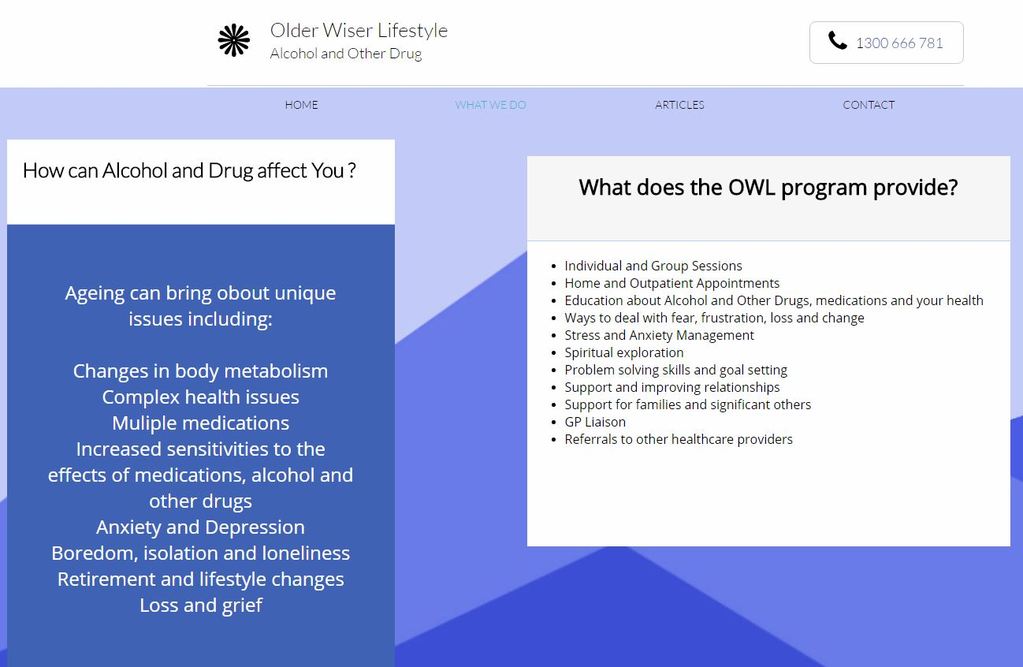Most people think about young adults when we think about those most prone to alcohol-related harm. However, Australian data show that the rate of risky drinking among young people has been decreasing, while risky drinking among senior citizens have been increasing.
There is a lack of specific research to indicate more precise levels for low-risk drinking among senior citizens. The Australian government has specific guidelines for the general population to minimise the risk of alcohol-related harm, but simply recommend that senior citizens drink less.
According to Stephen Bright, a registered psychologist and sessional academic from Curtin University and Ann Roche, Professor and Director of the National Centre for Education and Training on Addiction from Flinders University, senior citizens are at increased risk of experiencing alcohol-related harms for three main reasons: lower metabolism, medication intake, and other health conditions.
Less effective at metabolising alcohol
As we get older, our body becomes less effective at metabolising alcohol. This means that in an older person, alcohol has a more potent impact compared to a younger person consuming the same amount of alcohol. With a rapid increase in BAC, the likelihood of injury and falls among senior citizens who drink is higher.

Medication interacts with alcohol
Senior citizens are also more likely to be taking a range of medications, and these can interact with alcohol and cause an adverse drug reaction.
A study by BMC Geriatrics found that 60% of drinkers were taking at least one medication that could adversely react with alcohol. Many of these medications can severely interact with alcohol. Drinking alcohol while taking certain blood-thinning medications, for example, could cause increased risk of death from hemorrhaging.
Health conditions
Certain health conditions experienced by senior citizens can also be exacerbated by the effects of alcohol. High blood pressure and heart disease, for example, can be more difficult to treat when a person drinks alcohol.
Additionally, alcohol is a known carcinogen. As such, it is recommended that cancer survivors abstain from alcohol and that alcohol consumption be minimised to avoid the risk of developing various forms of cancer.

When does drinking become a problem?
Some people have been heavy drinkers for many years. In others, the same amount of alcohol packs a more powerful punch over time, but the amount of alcohol consumed hasn’t been reduced to take this into account.
In others, a drinking problem may develop later in life. This may be a result of major life changes such as death of dear friends or a loved one, moving to a new home, or failing health.
These kinds of changes can cause loneliness, boredom, anxiety, or depression. In fact, depression in senior citizens often goes along with drinking too much.
According to Bright and Roche, however, most senior citizens are unaware about alcohol risks, and many health-care professionals are reluctant to ask senior citizens about their alcohol use.
To support health professionals to navigate this delicate area, they published Australia’s first guidelines for health professionals to provide the necessary skills to assess senior citizens’ use of alcohol and other drugs.

Tips for senior citizens
Not everyone who drinks daily has a drinking problem and not all problem drinkers have to drink every day. The important thing to note is that drinking alcohol affects our health, and it does more so in old age.
Drinking alcohol increases the risk of falls and injuries and some chronic conditions, and Bright and Roche suggest that senior citizens drink less than the general recommended guidelines of two standard drinks per day, and to consult their health professionals about an appropriate level of drinking.
It’s a good idea to cut back or quit drinking so that you can lead a healthier lifestyle. Some things you can do include:
- Count how many standard drinks you are getting in each drink.
- Keep track of the number of drinks you have each day.
- Decide how many days a week you want to drink. Plan some days to be alcohol-free
- Pace yourself when you drink. Don’t have more than one alcoholic drink in an hour. In place of alcohol, drink water, juice, or soda.
- Make sure to eat when drinking. Alcohol will enter your system more slowly if you eat some food. See how bad it is to drink on an empty stomach.
- Get support from your family and advice from your healthcare provider. Get the help you need to quit.
It may not be easy to cut down or quit completely, which is why it’s important to take time to plan ahead. Here are some things you can do:
- Develop interests that don’t involve alcohol.
- Avoid people, places, and times of day that may trigger your drinking.
- Plan what you will do if you have an urge to drink.
- Learn to say “no, thanks” when you’re offered an alcoholic drink.
- Remember to stay healthy for the fun things in life—birth of a grandchild, a long hoped for trip, or a holiday party.
Read more of our tips on safe and healthy drinking and how to stay sober.
No one wants to get hurt or to hurt others as the result of too much alcohol. Yet, it can happen if you drink more than you should. Be aware of how your body changes as you age and be alert to these changes. By adjusting how much alcohol you can safely drink, you can continue to enjoy life to the fullest.
New programs such as the Older Wiser Lifestyle or the OWL program are a great source of information and support for senior citizens. Designed for senior citizens, aged 55 years and over, the OWL program offers support, counselling and education about the impact of alcohol and other drugs on health and well-being.






